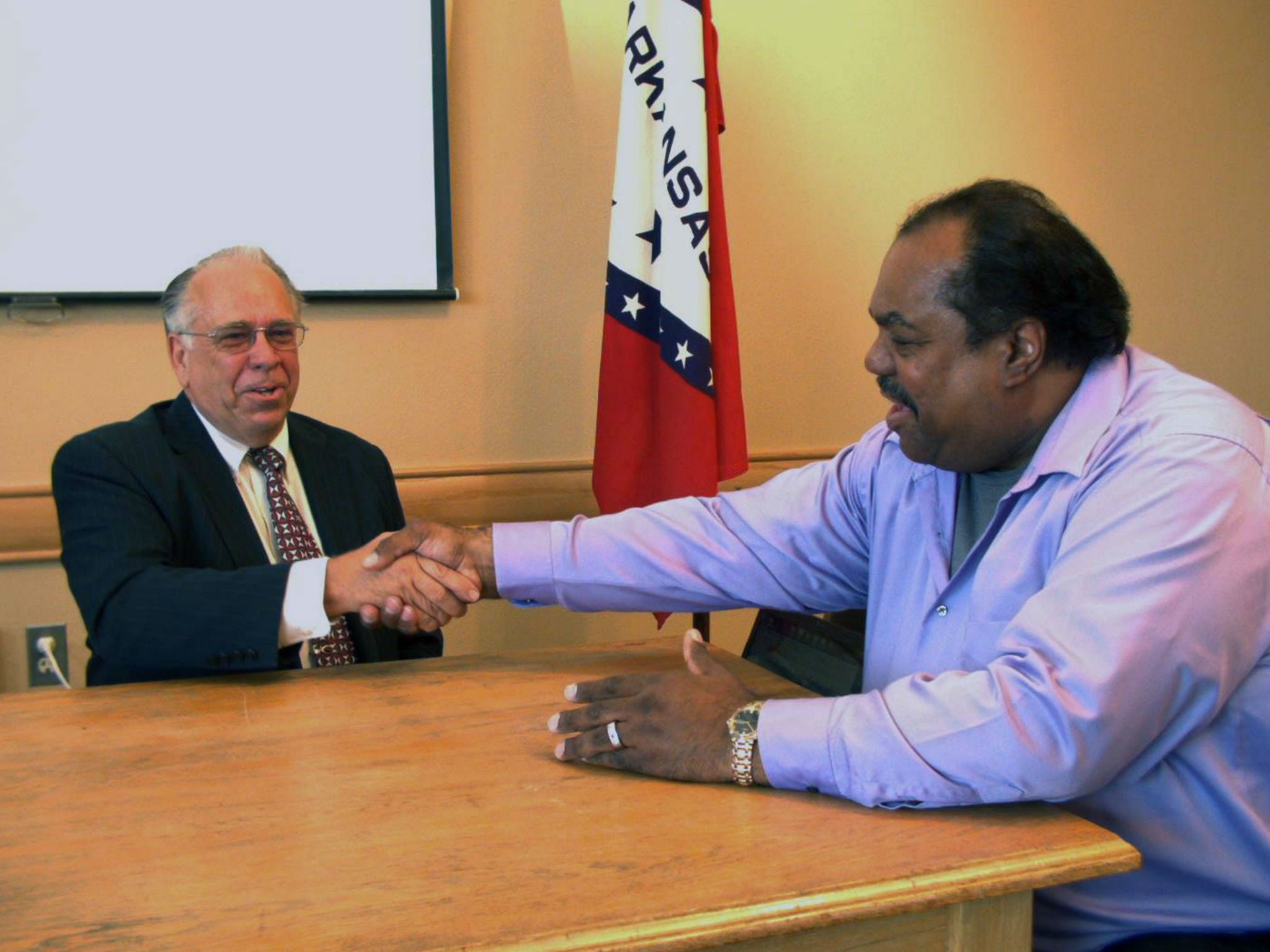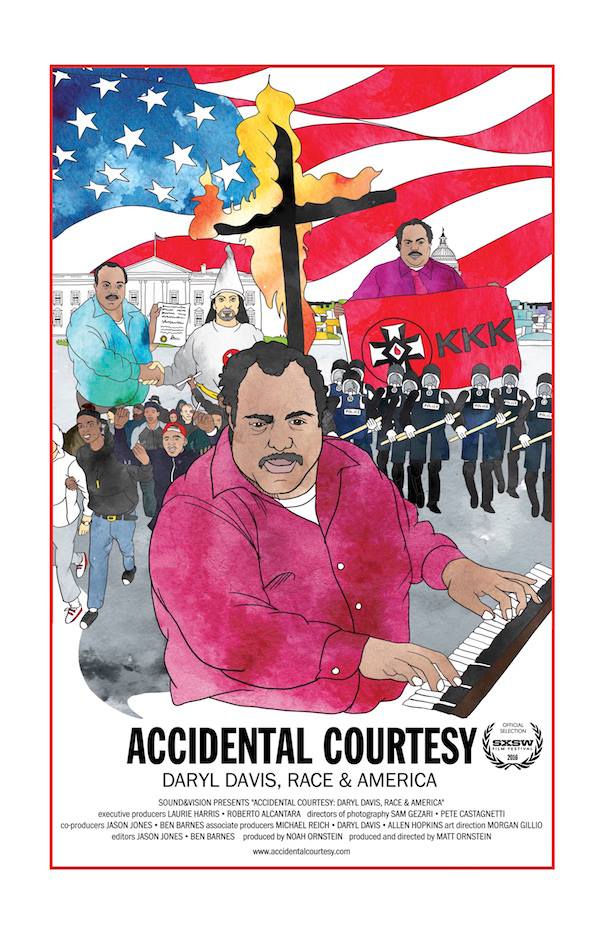SXSW 2016: Black musician Daryl Davis on why he has spent three decades befriending Ku Klux Klan members
Davis, reformed white supremacist Scott Shepard and director Matt Ornstein discuss their award-winning documentary, Accidental Courtesy: Daryl Davis, Race & America, with Daniel Dylan Wray

SXSW is teeming with people: musicians, directors, film stars, industry bigwigs, locals and street corner hustlers. The streets turn into seas as tens of thousands of people fill them each year. That said, for all the wide range of folk that flock to the city, encountering a black gentleman who befriends Ku Klux Klan members alongside a reformed member was an unexpected interaction at 2016’s festival.
Accidental Courtesy: Daryl Davis, Race & America received its world premiere at SXSW and it tells the unusual tale of Davis, who as a black musician (having played with many of the greats from Chuck Berry to Jerry Lee Lewis) has spent the last near thirty years meeting – and often befriending – members of the white supremacy group in order to open a dialogue and put a face and a handshake to the hate that the group direct towards his race.
Davis has been successful in aiding numerous KKK members to turn their back on the group and has been collecting their robes and hoods as souvenirs, which he one day hopes to exhibit in a museum. The film is a powerful statement on contemporary race issues in America as much as it is a character portrait of a unique individual. Scott Shepard also features in the film as a reformed KKK member and when the cast and crew took to the stage for a post-screening Q&A, Sheperd was trembling and close to tears, having just watched the film for the first time and witnessed the sorts of behaviours and racism he once fully supported.
Catching up with Davis, Sheperd and director Matt Ornstein after the premiere, they discuss the project, which won an award for best documentary at the festival. “I saw a story in The Guardian about three years ago. I think seeing the story in an abroad newspaper made it even starker. The headline was 'Black musician walks up to a KKK member in a bar...but this isn't a joke’” says Ornstein of finding his subject for the film.
Davis speaks movingly in the film about being pelted with rocks as a child when he was leading a scout procession in public. The leaders had to encircle him to protect him from the missiles. He was confused about the situation and when his parents told him that it was down to his skin colour he refused to believe them, so preposterous did it seem to him. “I had a lot of racist experiences as a child, all the way up into adulthood.” Davis says, “My curiosity was raised around the subject and why people act that way, so I started buying books on the topic.” A further run in with the deputy head of the Nazi Party while still in school “propelled me to learn more because I decided how can you learn to resolve something if you don't know anything about it. There were no classes so I had to self-educate.” One night when playing music in a country and western bar Davis was approached by a man who was in adoration of his playing and said he played like Jerry Lee Lewis. A conversation about how such music derived from black musicians in the first place ensued and they found themselves sat together in the bar when the man then revealed he had never sat down with a black person before because he was a Klansman. This triggered Davis’ journey, as captured in the documentary.

Shepherd tells of the emotion he felt watching the film with feelings wavering between guilt and happiness, “Guilt because I did so much and caused so much pain to other people, I just couldn't believe I had done that. It was like watching another person. But it was also a happy moment seeing the film because I am happy with who I am and where I am today and what I’m doing.” Sheperd then pulls out his business card to show me ‘Scott Sheperd, Reformed Racist. Anti-Racism Activist. There is only one race…the human race’. It reads. “I think Scott's level of self-awareness and emotional honesty is pretty rare,” says Ornstein of Sheperd’s contributions to the project.
Sheperd wasn’t just a regular Joe KKK member however, he was a Grand Dragon – and when he didn’t have a hood over his head, he was also a candidate for Governor in the state of Tennessee. Transferring personal hatred into an institutional setting is something that Davis has found to be common amongst his travels and research over the years. Things changed for Sheperd after an arrest one night, “In 1990 I got in trouble in Nashville. At the time there was a lot of nail bombs going off in the state of Alabama and Georgia and killing and hurting some people and me speaking out so much and being so vocal about my beliefs, I had wound up on the radar of the FBI and they were watching me. I left a restaurant one night and had a few drinks and they stopped me and found a loaded weapon on the front seat of the car. That threw me into the court system. I aimed to use one of the oldest tricks in the book and go to an alcohol and drug treatment centre, then get the paperwork take it to the judge and get the gun charged dropped and then go on with my racist life. What I didn't realise was that I would go into that treatment centre one person and come out another.”
During his rehabilitation Sheperd encountered and interacted with multiple races and shared similar hardships and circumstances. He slowly began to change his views, “I was forced to take a cold, hard look at myself and find out what the true problem was. The true problem wasn't with black people or other races, the problem was me.” He says. It’s left him in an at-risk situation and threats and abuse have been steady since his departure, a friend of his was even beaten up recently by Klansmen just through association with Sheperd. “If Daryl and I were to walk down the street together and encounter a Klansman, I’d be the first person they would attack or shoot because I’m a traitor. I betrayed the Klan.”
Davis is carrying on his pursuit of KKK members and is convinced his robe and hood collection of reformed members will grow. Despite the current and heated racial turmoil taking place in the U.S, he feels positive of what the future holds, “Things can always move faster but I do have hope for the future because of people like Scott and what he's doing and, believe it or not, I thank Donald Trump for what he's doing. I don't like his policies, I don't like what he stands for and I’m not voting for him but I thank him in the regard that he's bringing racial issues to the surface. The conversation is happening and this film that Matt has made is very timely, so I’m always grateful for the conversation as race is very taboo in this country and that taboo needs to be lifted before we can move ahead.”
Join our commenting forum
Join thought-provoking conversations, follow other Independent readers and see their replies
Comments